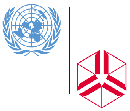
network of research and training centres and programmes
Issue 17: June 2002
 |
UNU Update | |
| The newsletter of United Nations
University and its network of research and training centres and programmes |
||
|
Issue 17: June 2002 |
||
|
New project looks at role of women UN University's Peace and Governance Programme has launched a new project to examine the needs of women and children in post-conflict societies. The project's first workshop – Women and Children in Post-conflict Peace Building – was held at UNU Centre in Tokyo May 26-27. Drawing from case studies around the world, the project will assess the most pressing issues that need to be addressed by local and external actors to secure a lasting return to acceptable economic, political, cultural, and educational conditions for women and children. War-torn
societies are marked by the traumatic disruptions of economic, political
and social relations between communities and community members.
Wars exacerbate existing divisions ad create new
ones. In many cases, the
nature of the political, economic and socio-cultural breakdown,
particularly of diverse communities, makes it extremely difficult to
re-create a sense of identity and belonging after the conflicts have
ended. Women,
mothers, and children, being among the more vulnerable populations in
conflicts, are particularly affected by the traumas of war in post-war
societies. While these
vulnerable populations suffer because of their limited access to power,
their interests continue to be underrepresented in post-conflict peace
building efforts unless NGOs and international organizations involved
in rebuilding war-torn societies take up their causes.
The
role of women and children in post-conflict societies has been a major
concern of the work of the UN, regional organisations and the NGO
community. This project attempts to provide a global, comparative,
perspective of the challenges that face women and children in
post-conflict peace building environments, to draw attention to and offer
lessons about a more just inclusion of the needs and interests of women
and children in rebuilding economic, political and cultural structures of
society. The project, co-directed by Dr. Albrecht Schnabel
(UNU) and Dr. Anara Tabyshalieva (Institute for Regional
Studies, Bishkek).
will run to the end of the year with final results to
be published next year. |
||
| |
||
|
Copyright © 2002 United Nations University. All rights reserved. |